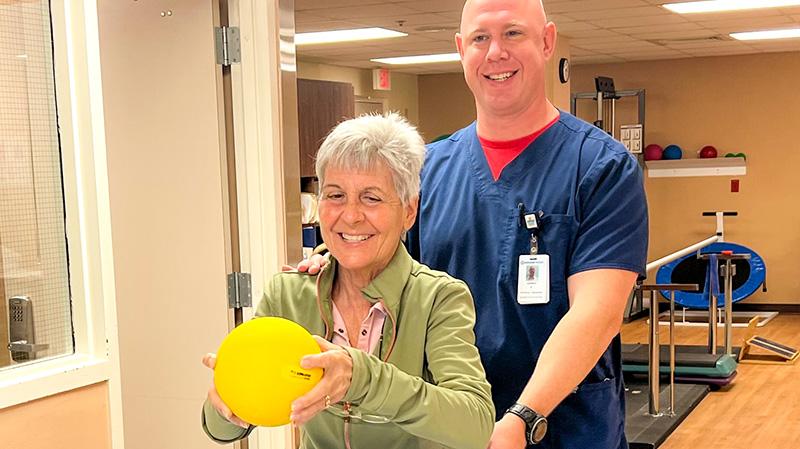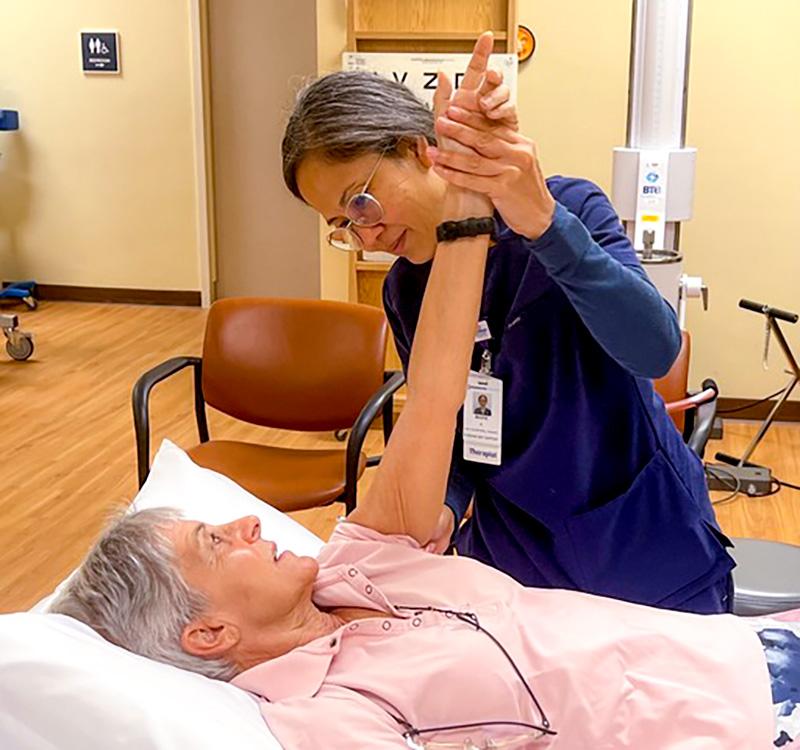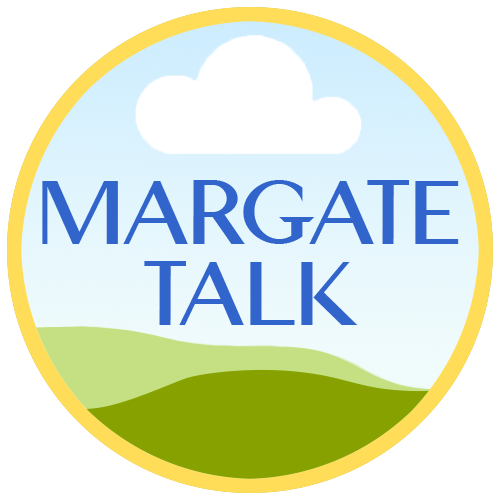
Loraine Scott with Darren Dase, a licensed physical therapist at Broward Health North. {Broward Health}
By Sharon Aron Baron
Loraine Scott, 71, of Coconut Creek, was enjoying her retirement, staying active, and spending quality time with her husband, children, and grandchildren until a traumatic bike accident in January.
Loraine was riding solo along a paved road at Tradewinds Park when she collided with another cyclist. The impact was severe, with both significant suffering injuries. Thankfully, an onlooker called 911. Paramedics transported Loraine to Broward Health North, a Level I trauma center specializing in caring for the most critical patients.
An evaluation indicated severe head trauma. When Loraine began slurring her words, she was immediately rushed into surgery, where Elizabeth A. Vitarbo, M.D., a neurosurgeon with Broward Health, operated on her to relieve pressure on her brain.
Scott does not remember being in the intensive care unit, undergoing an emergency tracheotomy, or lying in a coma for two weeks.
This type of head injury requires immediate care, said Dr. Vitarbo. Unfortunately, bicycle accidents have become more and more prevalent in South Florida, but as a trauma center, our emergency and trauma staff treat even the most complex cases for adult and pediatric patients.
Loraine’s family was understandably devastated upon learning of her accident and the extent of her injuries, but they fondly recall how compassionate and helpful the entire staff was and continues to be on her road to recovery.
Her husband, John, remembers how distraught he was when he arrived at the hospital.
“I encountered Sabrina at the visitor’s desk who literally stopped what she was doing, calmed me down, took the time to find out where my wife was, and escorted me to the operating waiting room,” he said. “I’ll never forget that and am forever grateful.”
Thankfully, Loraine does not remember being in the intensive care unit, undergoing an emergency tracheotomy, or lying in a coma for two weeks.
Depending on a patient’s prognosis post-surgery, a patient may need physical, occupational, and/or speech rehabilitative therapies.
Loraine required all three.
“I was a bit overwhelmed, but my daughter told me, ‘Mom, just think of this like you’re going to the gym,’ and that’s what really got me over the hump,” Loraine said.

Marie Kline is a licensed occupational therapist at Broward Health North.
Darren Dase, a licensed physical therapist at Broward Health North, started working on Lorraine’s recovery while she was still in a coma, providing a range of motion and stretching activities to maintain her flexibility as she recovered initially.
“When caring for our patients, we employ an interdisciplinary approach, and physical therapy is a critical component of the comprehensive healing process,” said Genevieve Boucher, regional manager of rehabilitation services at Broward Health North. “Even before surgeries are scheduled, PT is ordered so patients can maintain their range of motion.”
Loraine’s recovery continued, and although she did not have any physical pain, she suffered from severe vertigo and was continually nauseous and unable to eat much. “I was so dizzy that I did not want to move, let alone go to rehab,” she said.
To improve balance, Dase suggested exercises that included tossing a balloon.
“When I stood up, vertigo set in, and I was ready to quit,” Loraine said. “But Darren knew exactly what I needed to do. He instructed me to focus on a stationary object which helped, and ever since then; we got into a routine, which I really love and enjoy.”
Stephanie Barner, a speech-language pathologist, specializing in speech cognition and fine-tuning memory techniques, worked with Loraine to remaster her communication and problem-solving skills.
“Not only did Stephanie help get me to a place where I could take a sip of water without spinning, she taught me strategies to improve my memory and articulate what I was thinking,” Loraine said. “She gave me learning practices such as utilizing holidays in sentences in order of chronology which improved my reading abilities.”
During one of their sessions, Stephanie noticed the strategies Loraine used to problem solve and asked if she was ever a teacher, “which brought me to tears because I just retired last year as a teacher of 47 years, most recently at Tradewinds Elementary School.”
As part of her recovery, Loraine also required occupational therapy, which allows patients to relearn some of the tasks most take for granted, such as bathing, eating, grooming, and cooking as well as work-related fine motor skills including typing.
The hospital’s physical therapists train not only the patient but also their families and caregivers. After a patient has been discharged from the hospital, they may return for physical therapy sessions but will likely require additional assistance at home. So, according to Broward Health, it’s crucial that family members know what to expect and are trained for it.
Loraine remained in the hospital for six weeks and was ultimately discharged on Valentine’s Day.
A lifelong Catholic, she went straight to church to say a prayer and express her sincere gratitude for simply being alive.
“I really feel like the staff at Broward Health North had a vested interest in my recovery and supported me 100 percent,” said Lorraine.
“I have a totally new outlook and a profound respect for caregivers now.”
Got News? Send it to Margate Talk. Don’t miss reading Coral Springs Talk, Parkland Talk, and Tamarac Talk.
Author Profile
- Sharon Aron Baron is the Editor of Talk Media, which includes Margate Talk, Tamarac Talk, Coral Springs Talk, and Parkland Talk.
Latest entries
 NewsApril 17, 2024School Duel Returns with Monarch vs. Marjory Stoneman Douglas High School
NewsApril 17, 2024School Duel Returns with Monarch vs. Marjory Stoneman Douglas High School NewsApril 15, 2024Meet Apollo and Lucille: 2 Pets in Search of Forever Homes
NewsApril 15, 2024Meet Apollo and Lucille: 2 Pets in Search of Forever Homes NewsApril 12, 2024Official 2024/25 Broward County Public Schools Color Calendar
NewsApril 12, 2024Official 2024/25 Broward County Public Schools Color Calendar NewsApril 7, 2024Margate Holds International Day Festival
NewsApril 7, 2024Margate Holds International Day Festival




